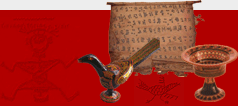|
诺苏民歌──中国改革中传递民族身份和情感的工具
Nuosu Songs: Expressions and Mechanisms of Maintaining Yi
Ethnic Identity
in the Context of Chinese Reforms
Kraef, Olivia 柯瑾艺
Dept. of Chinese and Asian Studies, Berlin Free University,
Germany
德国柏林自由大学中国与亚洲研究系
【摘要】在中国改革的背景下,对生活在大凉山的彝族(或者诺苏)包括今天在大都市生活的彝族来讲,音乐,特别是歌曲,已经变成了特殊的,起保护民族身份作用的工具。从传统意义上说诺苏人认为音乐,也包括诗歌,是他们的根。因此,甚至今天,音乐在四川和大都市彝族的日常生活包括所有的重要文化活动和节日里起到一个不可替代作用。在过去的十五年中,大都市的彝族艺人通过越来越多的公共平台,比如电视以及网络使诺苏民歌从传统意义的范围被介绍到整个中国社会。在从固定的传播范围里扩展到更多的“公共性领域”的过程里诺苏民歌不只有了一个形式方面的变化而且值得注意的是诺苏民歌更起到传递民族身份与保护本民族传统文化的作用。
中国改革开放的同时也带了不可避免的现象。像加速了农村──大都市流动,还有随之带来的大都市的多元文化,还有模糊的身份和生活方式的融合。越来越复杂的文化环境使中国的少数民族要面对一个持续性的以文化边界认定和在“中国特色社会主义”过程中的身份认定的过程。彝族的诺苏人也是这个过程的一部分。自上世纪八十年代以来愈来愈多的诺苏人特别是诺苏学者,政治家还有艺人搬到像北京这样的中国大都市。在适应新环境的过程当中他们中的某些人创造了以艺术为载体的文化平台。这些平台已经起到传播民族意识和保护民族文化的作用。也受到了彝族(诺苏)还有彝族以外主流文化的巨大认可。因为具有传播传统文化艺术
(“第三个空间”,芭芭) 的作用,这些平台可以连接关于少数民族和少数民族还有少数民族和主流文化以及关于(后现代)社会主义下的多元文化的长期重要含义。这篇文章借此表达今天农村和大城市里生活的诺苏人是通过各种各样的音乐平台在有意识和潜意识中面对中国改革情况下各方面的挑战。诺苏人之所以把民歌以及和民歌有直接关系的艺术形式像诗歌看成基本的传播传统文化作用的工具,不只归因于他们有丰富的民歌传统,还有在任何有彝族的领域,不管是大凉山或者大都市,民歌是每次聚会不可缺少的重要内容。民歌的重要性通过彝族(诺苏人)歌唱家在彝族社会的地位和像著名彝族
“彝Pop”乐队山鹰组合和国家一级演员曲比阿乌现代彝族歌曲也得到最明显的体现。这些音乐家通过各自的方式把传统民歌的成分比如旋律,形式,内容还有语言改变成能让彝族观众连接起过去和现在的文化的旋律和内容。也建立彝族和中国社会之间的关系。因此特别是新创作的彝族歌曲提供了一个超越文化和政治边界的艺术和个体的空间。通过音乐,彝族诺苏人在大凉山还有在大都市的范围创造了一种仪式性的表达空间。
在这个空间里诺苏人的宗教和日常生活里的音乐演变成一个能确定和保护民族身份的工具,但是同时没有置疑现存的文化秩序。
关键词:彝族 诺苏 音乐 民歌 歌曲 文化保护 民族身份 大都市彝族 节日 电视 网络 山鹰组合 曲比阿乌
空间 后现代社会主义 多元文化
Abstract
For both the Da Liangshan Yi or Nuosu and those Yi of
diasporic communities in Chinese urban centers today, the
art of music and especially vocal music in form of folksongs
has become an important instrument for (re-) defining and
preserving their ethnic identity in the context of Chinese
reforms. Traditionally referred to by the Nuosu as constituting,
together with poetry, none less than the roots of their
culture, sung music still plays a vital role in Nuosu daily
life and all major cultural events in both Sichuan and in
the Yi urban communities. The past 15 years have witnessed
the utilization of a substantial number of public platforms
such as television and the Internet by primarily diasporic
Nuosu artists, through which Nuosu songs have been carried
out of their original traditional settings or spaces of
meaning into Chinese society as a whole. In the process
of this “going public”, Nuosu songs have not only undergone
a structural transformation, but have witnessed a remarkable
re-valuation of their function as identity-constituting
cultural heritage. The P.R.C’s opening and launching of
major reforms has been inevitably accompanied by an increased
rural-urban migration, social and ethnic diversification
of urban society, and a consequent mixing of formerly clear-cut
identities and lifestyles. These developments have created
an increasingly complex cultural environment, in which society
and especially particular social groups like Chinese ethnic
minorities are confronted with an ongoing process of redefining
cultural boundaries and their ‘place’ in the nation’s project
of “Socialism with Chinese Characteristics”. The Nuosu,
too, are part of this development. Since the 1980s a steadily
increasing number of Nuosu, especially scholars, politicians
and artists have moved to large urban centers like Beijing.
In the process of adapting to the new environment, some
have created discursive platforms, primarily artistic in
content and structure, which have come to fulfill a central
function in the communication and transmission of ethnic
consciousness and ethnic cultural preservation. These platforms
have received substantial recognition by Yi and Nuosu China-wide
as well as by Chinese majority culture and the state. They
have, as a type of ‘third space’ (Bhaba 1994) and combined
with the traditional art forms they connect to, important
long-term implications for minority-minority and minority-majority
relations and for the issue of multiculturalism in a (post-)
socialist context. This paper argues that rural and urban
Nuosu today confront the challenges of preserving their
own ethnic identity in the face of Chinese reforms with
the conscious and subconscious creation of a variety of
musical platforms. The fundamental role of cultural agent,
which the Nuosu attribute to songs and related arts such
as poetry, is reflected not only in the rich Nuosu (folk-)
song tradition but also in the fact that songs, in both
the Yi language and standard Chinese, have long become perhaps
the most important feature of any Nuosu gathering, may it
be in Da Liangshan or in Beijing. It also becomes apparent
in the social standing of Nusou singers, and in the modern
expressions Yi vocal traditions find in the musical oeuvre
of contemporary Nuosu artists such as the “Yi-Pop” group
Mountain Eagles (Shanying Zuhe) and singer Qubi Awu. These
artists have - each in their own way - reworked elements
of traditional songs, like texture, structure, content,
and language to create a melody and a message that do not
only link, for their Yi listeners, a cultural past to a
cultural present, but which also serve to establish a connection
between the Yi and the rest of Chinese society. In this
sense, new Nuosu songs provide an artistic and a personal
space, which transcends cultural and political boundaries.
Through music, then, the Nuosu in Da Liangshan and urban
communities have created a type of ritualized space, in
which music as part of Nuosu religion and everyday life
advances to a medium for the affirmation and preservation
of ethnic identity, but without questioning the established
cultural order.
Keywords: Yi─Nuosu─music─folksongs─songs─cultural preservation─ethnic
identity─urban diaspora─festivals─media─Shanying Zuhe─Qubi
Awu─television─Internet─space─(post-) socialism─multiculturalism
作者简介:
柯瑾艺 (布金嫫),德国人,2003年德国柏林自由大学中国文化历史系硕士毕业,现为柏林自由大学中国文化历史系博士生。从2002年年初开始进行关于彝族的研究。主要研究领域:彝族妇女在北京
──中国改革下的社会性别和民族身份问题(硕士毕业论文);彝族音乐和文化保护。目前在北京学习和工作。
About the Author:
Olivia Kraef(Bbujjimo)is currently a Ph.D. candidate
in Department of Chinese and Asian Studies at Berlin Free
University, Berlin/Germany. She earned her Masters Degree
in Chinese Studies in 2003. Kraef’s interest and research
on the Yi began in early 2002 and led to the Yi Studies
related masters thesis on cultural identity of women of
the Yi diaspora in Beijing. Kraef currently works and studies
in Beijing.
|





